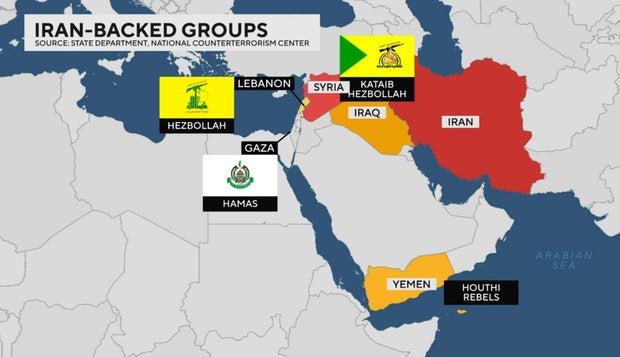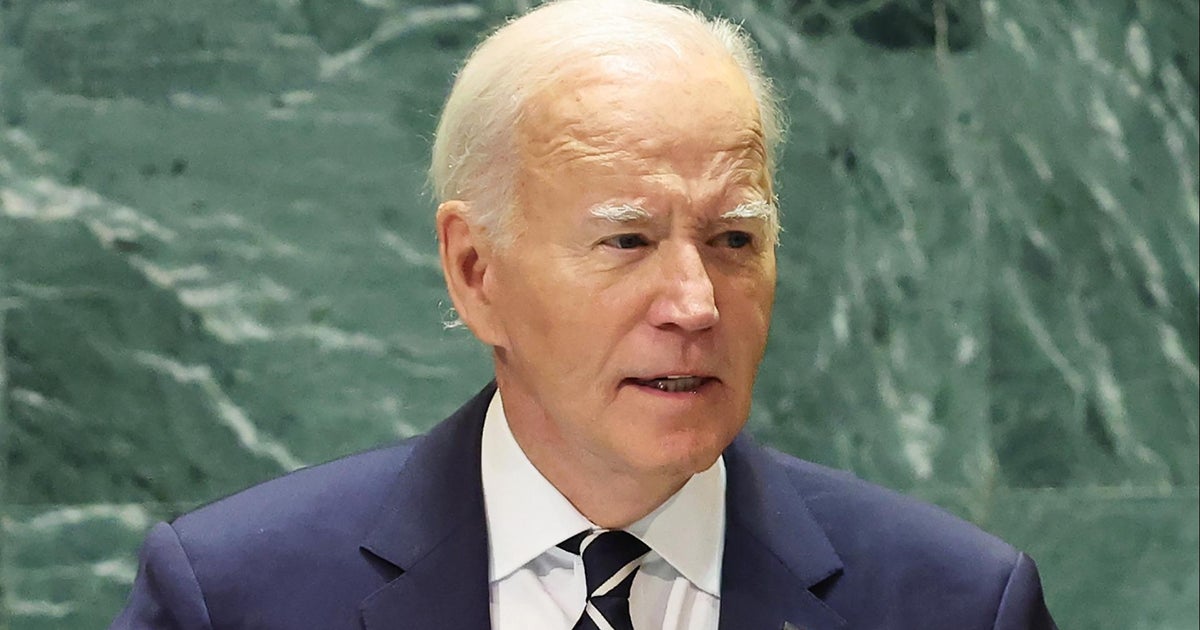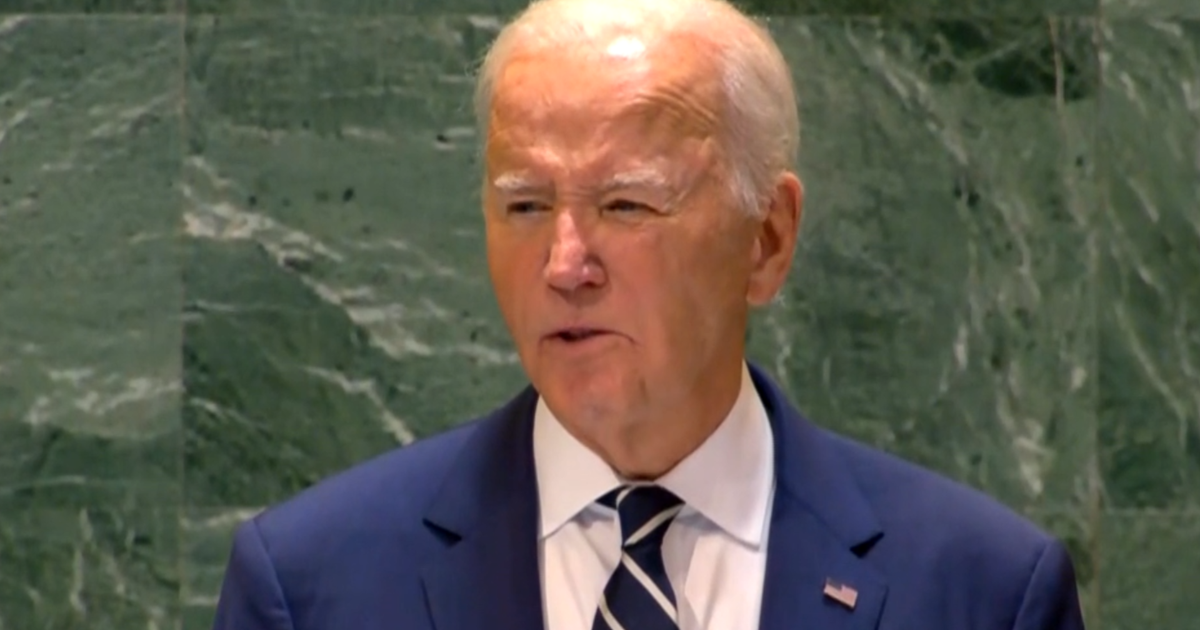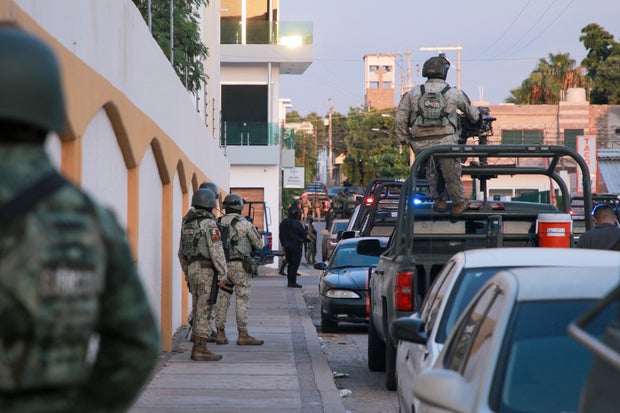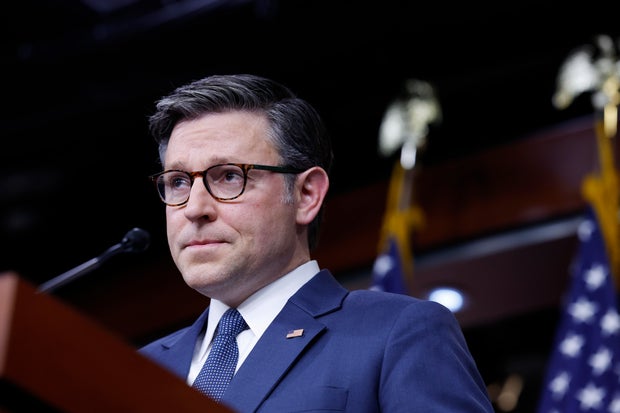CBS News
Israel launches new strikes on Hezbollah in Lebanon, warns people in Beirut and elsewhere to evacuate

Missiles slammed into southern Lebanon, shattering the early-morning silence Monday as Israel said it was targeting Hezbollah weapons hidden in residential buildings. The explosions came as Israel heralded a new wave of attacks on the Iran-backed group in Lebanon, warning civilians to flee from any areas where the organization had weapons or fighters positioned.
The warnings, delivered with automated phone calls, text messages and reportedly even over Lebanese radio stations hacked into by Israel’s military, came after a weekend of deadly crossfire between the two bitter enemies in the heart of the Middle East.
Hezbollah launched more than 100 rockets in a salvo over the weekend, and it sent them hurtling deeper into northern Israel and “toward civilian areas,” according to the Israeli military, wounding at least three people and spreading panic further into a region where many villages have already been abandoned.
Aziz Taher/REUTERS
In a video posted on social media, Israel Defense Forces spokesperson Avichay Adraee said Monday morning that raids on homes and other buildings being used by Hezbollah to hide and launch weapons in Lebanon would “begin soon,” warning residents to follow orders from the Israeli army to evacuate.
“The raids will begin soon. Evacuate the houses where #Hezbollah has hidden weapons immediately,” Adraee said in the video, speaking Arabic. “Hezbollah is lying to you and sacrificing you.”
“We are deepening our attacks in Lebanon, the actions will continue until we achieve our goal to return the northern residents safely to their homes,” Israeli Defense Minister Yoav Galant said in his own video message, warning his nation of “days ahead of us when the public will have to show composure.”
The warning to Israelis was likely a reference to expected retaliation from Hezbollah or Iran’s other so-called proxy groups in the region.
CBS News
Lebanon’s state-run media said people in some parts of the capital Beirut and in southern areas of the country — both areas where Hezbollah has long enjoyed significant support — received automated phone messages warning them to evacuate. The French news agency AFP said someone in national Information Minister Ziad Makary’s office got one of the calls.
The minister’s office told AFP that someone took a call on the office landline and heard a “recorded message” telling them to evacuate.
The warnings about what appeared likely to be a significant intensification of Israel’s assault on Hezbollah came after a weekend of increased fire between the two sides over Israel’s northern border with Lebanon, where the Iranian-backed group is a powerful political and military force.
Hezbollah started launching rocket and drone attacks on Israel as soon as Israel launched its war on Hamas in the Gaza Strip in response to that group’s Oct. 7 terrorist attack. Both Hezbollah and Hamas are backed by Israel’s long-time arch rival Iran, and both have long been designated as terrorist groups by both the Israeli and U.S. governments.
The IDF has stepped up strikes on purported Hezbollah targets across Lebanon for weeks, vowing to remove the threat they pose to enable the safe return of tens of thousands of residents from towns and villages in Israel’s northern border region who’ve been evacuated due to the cross-border fire.
As Israel ramps up offensive operations against Hezbollah, it does so with wary U.S. support. The Biden administration has voiced concern for months about the tit-for-tat attacks by Israel and Hezbollah, simmering in parallel to the war in Gaza, escalating into a full-scale conflict. The concern is based largely on an assessment that a wider conflict in the Middle East will put U.S. troops increasingly in direct danger. Iran-backed militias in Iraq and Syria have already targeted U.S. forces in the region with deadly drone fire during the Gaza war.
U.S. Secretary of Defense Lloyd Austin spoke on Saturday with Gallant following another barrage of Hezbollah rocket attacks on northern Israel, and he “reaffirmed the United States’ commitment to Israel’s right to defend itself,” according to a readout of the call from the Pentagon, but he also “stressed the importance of achieving a diplomatic solution” to the crisis and “his concern for the safety and security of U.S. citizens in the region.”
The long-feared escalation in violence between Israel and Hezbollah — which is a far larger and far better equipped militant group than its ally Hamas — started snowballing last week with Israel’s officially-unclaimed covert operations to blow up thousands of pagers and walkie talkies carried by Hezbollah members in Lebanon. Those attacks killed about 40 people, including an unconfirmed number of Hezbollah figures and at least two children, according to Lebanese officials.
Hezbollah leader Hassan Nasrallah admitted the explosions were a “severe blow” to the group, and he accused Israel of not only violating “all red lines” with the attacks, but of a “declaration of war.”
Israel hasn’t admitted to carrying out the complex attacks using rigged communications device, but CBS News learned that American officials were given a heads-up by Israel about 20 minutes before the operations began, though no specific details were shared about the methods to be used.
CBS News
How do your views on climate change compare to others in your area? Take this quiz and find out

About two-thirds of Americans say they are worried about climate change. Nearly 8 in 10 Americans support funding research into renewable energy, and 3 out of 4 support regulating carbon emissions. More than 60% believe Congress should do more to address climate change, according to data from the Yale Program on Climate Change Communication.
Even in Jack County, Texas, where Donald Trump received 90% of the vote in 2020, 58% support regulating carbon emissions. That’s the lowest of any U.S. county.
Still, climate change remains a deeply polarizing issue within Congress and on the campaign trail.
The Inflation Reduction Act of 2022, which the White House called “the most significant climate action in U.S. history,” provided nearly $400 billion for climate solutions. It passed Congress strictly along party lines, with no Republicans voting in favor.
In 2023, Democrats voted for pro-environmental legislation more than 90% of the time, while Republicans voted for pro-environmental legislation less than 5% of the time, according to voting data collected by the League of Conservation Voters.
“We see pretty much across the board, at all levels of government, that government officials dramatically underestimate the level of support from their own constituents,” Tony Leiserowitz, the director of the Yale Program on Climate Change Communication, told CBS News.
Answer the questions below — which are a selection of the same questions asked by the Yale program’s survey to create their Climate Opinion Maps — to see how your beliefs about climate change compare to others in your area and the nation.
CBS News
Ice cream shops and pharmacy linked to ruthless Mexico cartel, U.S. Treasury Department says

The U.S. Treasury Department on Tuesday said it sanctioned two Mexican businesses – an ice cream chain and a local pharmacy – for allegedly using proceeds of fentanyl trafficking to finance their operations tied to the Sinaloa cartel.
The move comes as rival cartel factions have been in a deadly conflict with each other and authorities following the surprise arrest on U.S. soil of Sinaloa Cartel co-founder Ismael “El Mayo” Zambada in late July, which is believed to have unleashed an internal power struggle within the group.
Treasury’s Office of Foreign Assets Control — the U.S. agency that combats illicit funds and money laundering — said people previously cited for money laundering had set up a chain of ice cream and popsicle shops in the state of Sinaloa.
The Sinaloa cartel often uses their earnings from international drug trafficking to establish businesses, pouring cash into everything from fraudulent timeshare operations to restaurants to launder money.
OFAC said that another individual set up a pharmacy and convenience store using drug proceeds in the northern state of Sonora.
“President Biden and Vice President Harris are committed to using every tool at our disposal to combat the cartels that are poisoning our communities with fentanyl and other deadly drugs,” said Deputy Secretary of the Treasury Wally Adeyemo in a statement.
The sanctions come days after the U.S. rejected accusations by Mexico’s President that the U.S. was partly responsible for a surge in cartel warfare that left dozens of people dead in Sinaloa.
IVAN MEDINA/AFP via Getty Images
The cartel is responsible for a significant portion of fentanyl trafficking into the U.S. They precursor chemicals from China and India to make the synthetic opioid and smuggle it into the United States, where it causes about 70,000 overdose deaths annually.
Jesús Norberto Larrañaga Herrera, known as “El 30”, and Karla Gabriela Lizárraga Sánchez, established “Nieves y Paletas,” an ice cream chain with several storefront locations around the capital using drug proceeds, according to the U.S. Treasury Department.
OFAC said a retail pharmacy and convenience store in Sonora were tied to drug trafficker José Arnoldo Morgan Huerta, nicknamed “Chachio.” His brother, Juan Carlos Morgan Huerta, known as “Cacayo,” is a Sinaloa cartel “plaza boss” and oversees drug trafficking in the border city of Nogales.
“Today’s action is part of a whole-of-government effort to counter the global threat posed by the trafficking of illicit drugs into the United States that is causing the deaths of tens of thousands of Americans annually, as well as countless more non-fatal overdoses,” the U.S. Treasury Department said in the statement.
Separately, the Treasury Department also announced Tuesday it was sanctioning five leaders of Colombia’s Clan del Golfo (CDG), a top drug trafficking network.
The Gulf Clan “is one of the country’s largest drug trafficking organizations and a key contributor to human smuggling through the Darién Gap,” officials said in a statement.
In July, U.S. President Joe Biden announced a series of proposals aimed at curbing the ongoing drug epidemic. These include a push on Congress to pass legislation to establish a pill press and tableting machine registry and enhance penalties against convicted drug smugglers and traffickers of fentanyl.
CBS News
House to vote on 3-month funding extension to avoid government shutdown

Washington — The House is set to vote Wednesday on a stopgap measure to keep the government funded for three months, after Speaker Mike Johnson embraced a clean temporary funding measure that will need support from Democrats to pass.
Last week, the House rejected Johnson’s initial funding plan, which would have kept the government funded for around six months and was paired with a noncitizen voting measure that Democrats viewed as a nonstarter. After the setback, which was driven in part by his own party, the speaker said he would opt to bring up a vote on a measure to extend funding through Dec. 20 without the voting proposal, rather than risk a government shutdown weeks ahead of Election Day.
Then on Monday, Johnson was delivered another setback when the stopgap measure failed to secure enough support on the House Rules Committee, forcing House leadership to bring up the funding bill for a floor vote under suspension of the rules — a process that requires support from two-thirds of the chamber for passage.
Johnson said on Tuesday that he expects the continuing resolution to “pass by a wide margin,” while making clear that he thought “the best play under the circumstances was the CR with the SAVE Act,” referring to the voting measure.
“This was our opportunity to both vote to fund the government and ensure the security of the election, but we came a little short of the goal line,” Johnson said. “So we have to go with the last available play.”
The speaker called the legislation a “very narrow, bare bones” temporary measure. And while he noted that “we loathe [continuing resolutions] as much as anyone,” he said “it would be political malpractice to shut the government down.”
The government funding vote
Anna Moneymaker/Getty Images
The vote on the funding measure Wednesday could draw more support from Democrats than Republicans, given conservative opposition to the continuing resolution. The same dynamic has occurred in recent funding disputes, putting House Republican leadership in an uncomfortable position with their conference.
House Democratic Caucus Chair Pete Aguilar said on Tuesday that with Johnson’s move to proceed with the vote, the belief is “he has the Republicans to pass the bill,” adding that Democrats will “work in a bipartisan way to make sure that this gets done.”
The House is set to depart for a lengthy recess following the vote to keep the government funded, and won’t return until after the Nov. 5 election. And with the three-month funding measure, they’ll face a pre-holiday deadline to prevent a shutdown after their return. House Republicans have fretted about the outcome, which Congress frequently falls back upon. But Johnson said on Tuesday that House leadership opposes an omnibus funding package around the holidays.
“I have no intention of going back to that terrible tradition,” Johnson said, suggesting that he would push to approve the 12 full-year spending bills after the election.
The Senate will also need to act to prevent a shutdown ahead of the Oct. 1 deadline, assuming the House bill passes. Senate Majority Leader Chuck Schumer encouraged the House to approve the continuing resolution “quickly,” saying on Tuesday afternoon that “time is of the essence.” He outlined that the Senate will move swiftly on the stopgap measure once it passes the lower chamber to avert the shutdown threat.
“If we work together, stay away from poison pills and partisanship, we can avoid a government shutdown,” Schumer said.



